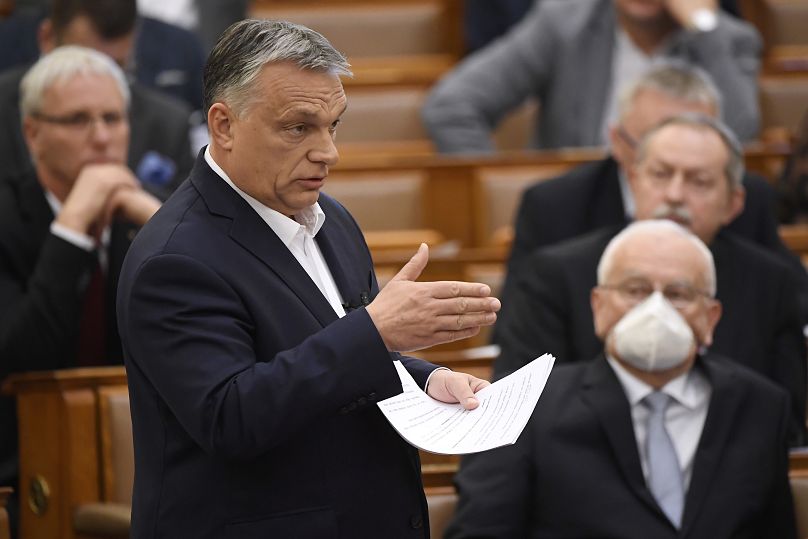Hungary's foreign minister, Péter Szijjártó, insists Orban's new powers will only be related to the 'pandemic situation'.
Hungary's foreign minister has dismissed criticism of giving new powers to Prime Minister Viktor Orban as "simply fake" and "not true".
Speaking to Euronews, Péter Szijjártó insisted the prime minister's ruling by decree would only be in action in relation to the coronavirus pandemic and that it was "a lie" to suggest this would be unlimited.
The emergency legislation, which was approved by parliament several weeks ago, has been widely condemned by the EU, UN and other rights groups for giving Orban sweeping powers to sidestep parliament when creating new laws, and for not specifying a date this would end.
Its apparent lack of time limit - or limit for a review process - has led to further concerns that the prime minister could eventually be reluctant to let go of this new authority.
Szijjártó said of critics in the EU: "They said there is an unlimited authorisation for the prime minister, which is not true - it is fake. This is a lie.
"The Hungarian prime minister and the Hungarian government can only make decrees in accordance with the protection of the people against the pandemic situation."
Hungary has confirmed just under 2,000 cases of COVID-19 and around 200 deaths.
In addition to the law having no stated time limit, it also includes measures to allow anyone seen to spread false information about the pandemic to be jailed for five years.
Critics, including the European Commission and 13 EU countries that signed a letter of disapproval, worry this could see anyone opposing the prime minister being imprisoned.
A statement from European Commission President Ursula von der Leyen - issued days after Hungary approved the legislation - warned emergency measures should not be introduced "at the expense of our fundamental principles and values".
She added: "Any emergency measures must be limited to what is necessary and strictly proportionate. They must not last indefinitely.
"Moreover, governments must make sure that such measures are subject to regular scrutiny."
But, on Monday, Szijjártó said he felt such criticism amounted to "political attacks" that had been fuelled by the EU's opposition to the government and its strict policies during the 2015 migration crisis.
"The European Parliament keeps Hungary under a continuous attack by political motivation in recent years, basically since 2010 since we have been in office, and since 2015, when the migration crisis has hit," he told Euronews.
"And we have been representing a very strong and tight migration policy that definitely goes against the European mainstream, and definitely goes against the position of the European Parliament.
"So, basically, we got used to these kinds of attacks by the European Parliament - but many times these attacks are based on perceptions and other facts."
Szijjártó went on to say that it would be "fake" to say Hungary was the only country in the EU to have enacted similar laws amid the pandemic, accusing the EU of double-standards in its opposition.
Belgium's caretaker government was approved last month for emergency powers that could bypass parliament to create new laws - but, unlike, Hungary, this involves a review period every three months over six months.
However, several other EU countries have also come under criticism for appearing to take advantage of the pandemic for political gain.
This includes Poland, which is insisting on going ahead with an election next month despite warnings this could endanger voters.
It is also being criticised for giving an unfair advantage to the incumbent president, Andrzej Duda, from the ruling Law and Justice Party. That's because while opposition parties have had to cancel much of their election campaigning, the government has had plenty of airtime around its efforts to tackle the pandemic.
European Parliament President David Sassoli stressed earlier this month that emergency situations should not signal a death in democratic policy.
Speaking to Euronews, he said: "We believe that if we stick to our values, we confront this crisis better and give the best responses to our citizens.
"We do not believe that in emergency situations democracy should be suspended."












